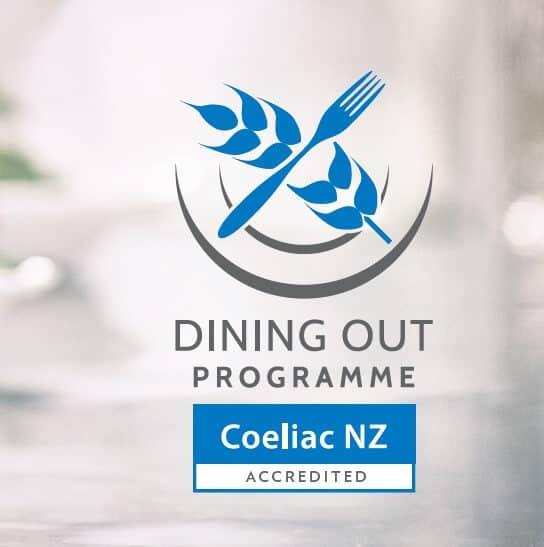

The choice of being gluten-free for life, is becoming better understood as being more than a diet trend, now that an increasing number of people are being diagnosed with coeliac disease.
A growing community of people are preferentially seeking safe gluten free options when dining out and are bringing their friends and family along with them. People diagnosed with coeliac disease must follow a strict gluten-free diet for life. The Dining out Programme (DoP) developed by Coeliac New Zealand responds to this requirement. It is intended to provide important support, guidance, and an opportunity for food service providers to achieve a locally and internationally recognised accreditation standard – that people who need to eat gluten free can trust and have confidence in.
“For some people with coeliac disease the presence of even a small amount of gluten from a cross contaminated cooking utensil or dish can cause real illness. However, that doesn’t mean they don’t want to eat out, and as more restaurants become accredited with the DoP they can do so safely.” says Coeliac NZ spokesperson Dana Alexander. “Demand for coeliac safe gluten-free food is growing, as prevalence of the disease increases, and more people choose to avoid gluten for other health and lifestyle reasons.”
The DoP was established five years ago to provide New Zealand hospitality industry a best practice management system for the safe sourcing, preparation, and service of gluten free food. It ensures that those with a gluten free menu has adequately followed safe food policies and procedures to eliminate and manage the risk of gluten cross contamination in all stages of food handling to meet the Food Standards Australia New Zealand Code (FSANZ) definition of ‘nil detected’ for gluten.
What is Coeliac Disease
Coeliac disease is an auto-immune condition characterised by a chronic intestinal reaction to dietary gluten. The only recognised treatment is the adoption of a strict gluten-free diet, for life. People of all ages can have coeliac disease, and the importance of understanding the disease and how to manage a gluten free diet is particularly important for their wellbeing. International research indicates there could be up to 100,000 people in our NZ team of 5 million with coeliac disease and of those 30,000 are likely to be children under the age of 18. However, a large proportion of those with having the underlying condition are unaware they have the disease.
Although a gluten-free diet is effective, there are recognised challenges with following the treatment, particularly from a social perspective, and especially during teenage years. A gluten-free diet is typically more expensive and harder for individuals to maintain than a regular diet, often because of the challenges of eating out, which can contribute to non-adherence to the diet. The quality of information around whether a particular food or ingredient is gluten-free and the potential for cross-contamination when eating in restaurants, when travelling or in hospital is a significant burden of managing this disease. Gluten contamination is also known to increase the potential risks for preventable long-term health complications for people with coeliac disease and related expenses.
Meeting the Food Standards Code
For the gluten-free customer, knowing a restaurant or food service establishment has a credible and identifiable third-party gluten-free programme in place is very important. For the restaurant, café and foodservice owner, the DOP functions as a strategic partner by taking the guesswork out of developing and delivering a gluten-free standard safety programme.
While many top dining restaurants and menus now include some mention of gluten-free options, many of these do not actually meet the Food Standards code. Foodservice establishments must take non-negotiable gluten-free food safety precautions very seriously if they are to offer coeliac-safe gluten-free food to customers with coeliac disease and gluten-intolerance. These potential patrons often fear dining out because they have no control over the preparation of their food and the consequences of error are significant. They want assurances that the restaurants and food service establishments they frequent understand the importance of proper gluten-free food preparation and have authenticated procedures in place that will keep them safe, avoid cross-contamination and allow them to have an enjoyable dining experience without consequences.
All food service businesses are encouraged to apply this best practice when offering gluten-free food options on their menu, and whilst some requirements of this standard are already in place under the provision of basic food safety, this information focuses on protocols, procedures and staff training to ensure coeliac safe gluten-free food options are available.
The programme provides an independent endorsement and a simple, online staff training programme to ensure gluten-free food is produced and served safely. Accredited businesses are listed on the CNZ website and will be promoted as part of its ‘GF Dining Out Club’ which is under development.
Please email dop@coeliac.org.nz or visit coeliac.org.nz/food-industry/dining-out-programme to download an application form.
Coeliac Awareness Week
Coeliac Awareness Week runs from 7-13 June 2021 this year. With the theme What’s Behind The Label? Coeliac NZ aims to raise awareness about the importance of providing gluten-free food options for people with coeliac disease within restaurants, food service establishments and in supermarkets. As part of this, Coeliac NZ will be promoting DoP participants, to encourage people with coeliac disease as well as their friends and families to look for the accreditation when choosing to dine out.